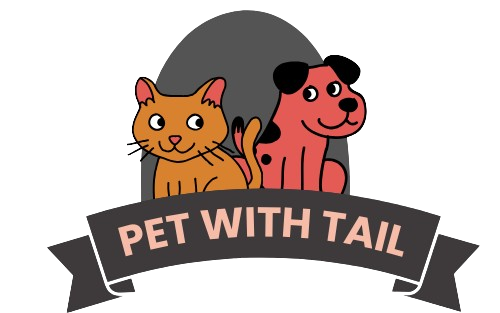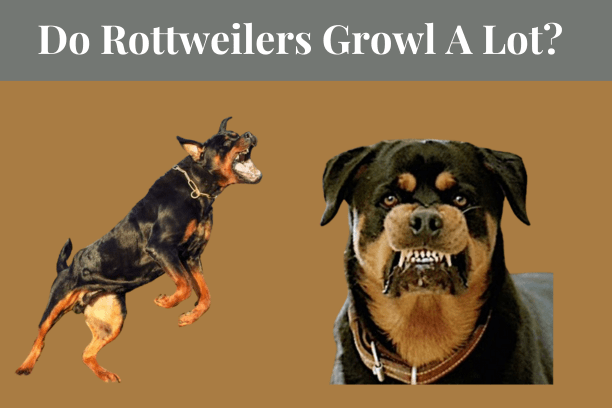When it comes to intimidating dog breeds, Rottweilers often top the list. Their strong, muscular bodies and imposing facial features can send most people walking in the other direction.
Do rottweilers growl a lot? Rotties are often misunderstood based on their appearance alone. Beneath that tough exterior lies a loving, loyal, and playful dog that can make an excellent family pet. Let’s dive into the fascinating world of Rottweilers and explore their unique vocal behavior: growling.
Contents
- 1 Do Rottweilers Growl A Lot? And Why We Are Afraid of the Growl?
- 2 The ‘Rottie Grumble’: A Unique Trait
- 3 When Is Your Rottweiler Being Aggressive?
- 4 Other Factors That Can Cause Growling
- 5 What are some other common Rottweiler behaviors?
- 6 Understanding Rottweiler Vocalizations: Beyond the Growl
- 7 Training Your Rottweiler to Stop Growling
- 8 Responding When Your Rottweiler Growls
- 9 Ignoring a Growling Dog: Yes or No?
- 10 Conclusion
- 11 FAQs About Do Rottweilers Growl A Lot?
Do Rottweilers Growl A Lot? And Why We Are Afraid of the Growl?
The universal interpretation of a dog’s growl tends to raise concern. We associate growling with aggression or danger. However, for Rottweilers, growling is simply a form of communication. Let’s demystify this behavior and understand why Rottweilers growl:
Is It Normal for Rottweilers to Grow?
Yes, Rottweilers do growl—a lot! They are known as a vocal dog breed, and many Rottweiler owners affectionately term their growling as “grumbling.” But fear not; this isn’t aggressive growling. Instead, it’s a trait specific to this breed. Here are some common scenarios when Rottweilers might let out their distinctive grumble:
Playtime
Rottweilers often growl during play. It’s their way of expressing excitement and enthusiasm. So, if your Rottie playfully growls while chasing a ball or wrestling with you, it’s perfectly normal.
Affection
When being petted or cuddled, Rottweilers may emit low grumbles. It’s their version of contentment—a sign that they’re enjoying the attention.
Picture this: Your Rottie lying in the sun, eyes half-closed, and softly grumbling. That’s their way of saying, “Life is good!”
The ‘Rottie Grumble’: A Unique Trait
The Rottweiler’s grumble is distinct. It’s a deep, resonant sound that can send shivers down your spine. But remember, it’s not a warning; it’s their way of expressing themselves. So, when you hear that low rumble, rest assured—it’s not aggression.
What Should You Do When Your Rottie Grumbles?
- Stay Calm: Don’t panic when your Rottweiler grumbles. Observe the context. Are they playing? Being petted? Happy? Adjust your response accordingly.
- Positive Reinforcement: If your Rottie grumbles during play, reinforce the behavior positively. They’ll appreciate it.
- Health Check: Sometimes, growling can indicate pain or discomfort. If it persists or seems unusual, consult your vet.
Related Dog Breed: How to Care for Your Pregnant Maltese
Cocker Spaniel Growling And Snapping
When Do Rough Collies Stop Growing?
When Is Your Rottweiler Being Aggressive?
Aggressive growling is different. It’s accompanied by other signs like raised hackles, bared teeth, and stiff body language. If your Rottie shows these signs, seek professional help.
Other Factors That Can Cause Growling
- Resource Guarding: Rottweilers may growl when protecting their food, toys, or territory. Respect their boundaries.
- Fear or Anxiety: A scared Rottie might growl. Identify stressors and address them gently.
- Past Trauma: Some Rotties carry emotional scars from previous experiences. Patience and understanding are crucial.
What are some other common Rottweiler behaviors?
Certainly! Rottweilers exhibit a range of behaviors that make them unique and endearing. Here are some common Rottweiler behaviors you may encounter:
- Rottweilers Rumble (Grumble):
- When happy or content, Rotties emit a low, rumbling sound often referred to as the “Rottie grumble” or “purr.”
- It’s their way of expressing joy and comfort.
- Protectiveness:
- Rottweilers have a strong protective instinct.
- They are loyal and will guard their family and territory.
- Love for Children:
- Rotties adore kids and are gentle with them.
- They make excellent family dogs.
- Velcro Dogs:
- Rottweilers love to be close to their humans.
- They’ll follow you everywhere, earning them the nickname “Velcro dogs.”
- The Rottie Lean:
- Rotties lean against their owners or sit if they can.
- It’s a sign of affection and a desire for physical closeness.
- Empathy:
- Rottweilers are emotionally intuitive.
- They sense their owner’s moods and respond accordingly.
- A-Type Personalities (Working Rotties):
- Rottweilers bred for work can have strong personalities.
- They thrive on mental and physical challenges.
- Water Eaters:
- Some Rotties “eat” water by splashing it around.
- It’s a playful behavior.
- Butt Scratch Dance:
- Rottweilers often do a little dance when their butt is scratched.
- It’s their way of showing delight.
- Intimidating Stares:
- Rotties have intense stares.
- It’s not aggression but a way to assert dominance.
Remember, each Rottweiler is an individual, and their behavior can vary. Understanding their unique quirks and providing proper training and care ensures a happy and well-adjusted Rottie companion.
Understanding Rottweiler Vocalizations: Beyond the Growl
Rottweilers, with their powerful build and imposing presence, often communicate through more than just growls. Let’s explore other vocalizations and learn how to manage them effectively.
1. Barking: The Rottie’s Verbal Arsenal
- Barking: Rottweilers are vocal dogs, and barking is their primary mode of communication. They bark to express excitement, alertness, or even boredom. A certain amount of barking is normal, but too much barking can be annoying. Training your Rottie to bark on command and then quiet down is essential.
2. Whining and Howling: Expressing Emotions
- Whining: Rottweilers may whine when they’re anxious, seeking attention, or in discomfort. Pay attention to the context—whether it’s a plea for playtime or a sign of distress.
- Howling: Howling is less common in Rotties but can occur. It’s often triggered by loneliness or a response to other dogs’ howls. If your Rottie howls excessively, consider addressing any underlying issues.
Training Your Rottweiler to Stop Growling
- Positive Reinforcement: To curb growling, use positive reinforcement. Reward calm behavior and redirect their attention when they start growling.
- Desensitization: Gradually expose your Rottie to situations that trigger growling (e.g., strangers, other dogs)—reward calm behavior during these encounters.
- Professional Help: Consult a professional dog trainer if growling persists or escalates.
Responding When Your Rottweiler Growls
- Stay Calm: Don’t panic. Observe the context. Is it playtime, affection, or a warning?
- Avoid Punishment: Punishing growling can backfire. Instead, address the root cause (fear, anxiety, etc.).
- Safety First: If growling is aggressive (accompanied by raised hackles, or bared teeth), prioritize safety. Seek professional guidance.
Ignoring a Growling Dog: Yes or No?
- Context Matters: Ignoring growling isn’t always the best approach. Understand why your Rottie is growling. If it’s fear-based, ignoring may worsen the situation.
- Address the Cause: Identify triggers (e.g., resource guarding, territorial behavior) and work on them.
Remember, Rottweilers are complex and expressive. Respect their individuality, and with patience and training, you can foster a well-adjusted and harmonious relationship.
Conclusion
Do rottweilers growl a lot? So, the next time your Rottweiler grumbles, appreciate their unique vocal style. It’s a language all their own—a bark often worse than their bite. Remember, behind that powerful exterior lies a loyal companion who just wants to express themselves.
FAQs About Do Rottweilers Growl A Lot?
Q. Why Does My Rottweiler Growl at Me When I Hug Him?
- Rottweilers, like all dogs, communicate through various vocalizations and body language. When your Rottie growls during a hug, it’s essential to understand the context:
- Comfort Zone: Hugging can be uncomfortable for dogs. They interpret it as a form of restraint or invasion of their personal space.
- Body Language: Observe your Rottweiler’s body language. Raised hackles, stiff posture, or avoidance indicate discomfort.
- Positive Associations: Gradually associate hugs with positive experiences (treats, praise) to reduce growling.
Remember, each dog is unique. Some Rotties love hugs, while others prefer different forms of affection.
Q. Do Rottweilers Have Anger Issues?
- Rottweilers don’t inherently have anger issues, but their behavior depends on genetics, upbringing, and socialization. Factors to consider:
Temperament: Rotties are protective and loyal. Proper training channels their protective instincts positively.
Socialization: Early exposure to various people, animals, and environments helps prevent aggression.
Owner Responsibility: Responsible ownership includes training, exercise, and understanding your Rottie’s needs.
Q. Do Rottweilers Growl a Lot at Night?
A. Rottweilers, being vocal dogs, may growl occasionally at night. Common reasons include:
- Guarding Instinct: Rotties are protective. If they sense something unusual (noises, strangers), they may growl.
- Dreams or Discomfort: Like humans, dogs dream. Growling during dreams is normal. Also, discomfort (pain, anxiety) can lead to nighttime growling.
- Attention-Seeking: Some Rotties growl to get attention or express boredom.
Observe your Rottie’s behavior, ensure a comfortable sleep environment, and address any underlying issues.
Patience, positive reinforcement, and understanding go a long way in managing Rottweiler’s behavior.




